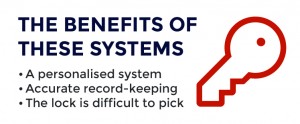
The Unmissable Benefits of Restricted Key Systems
Have you been looking for an improved security system that offers an extra layer of protection to your home or business? If you are storing important documents or high-value assets, or you simply require greater security, a restricted key system may be a beneficial inclusion for your property. These security systems restrict access to specified doors throughout a commercial or residential property, ensuring only authorised individuals with specialised keys can access these areas.
With security becoming even more important in the modern day, these systems have been favoured in a range of commercial and residential premises all across the globe. To help you decide whether these systems suit your needs, we’ve detailed some of their most important benefits in this article.
What is a Restricted Key System?
A restricted key system is a hierarchical key and lock system that restricts access to specified areas within a building to individuals with a particular type of key. A crucial element of these restricted keyway systems is that duplication of keys cannot be completed without authorisation. Essentially, the system is controlled entirely by a single designated person, known as an authorised signatory, because additional keys can only be cut at the request of these individuals.
Every single key produced in a restricted key system has its own unique key identification number, and any attempt to duplicate these keys is prohibited without the written approval of the authorised signatory. These keys are very often subject to a patent, and this means they can also only be cut by the locksmith that owns them. As a result, it is illegal for an alternative locksmith to duplicate these keys, offering the owner greater security in key cutting.
These restricted keyways are subject to an intricate process with numerous layers of protection, and this has contributed to their great popularity. A diverse range of benefits can be encountered by installing these systems, whether in your residential property or commercial premises.
The System Can Be Personalised
Among the major benefits of these highly secure systems is their enormous scope for personalisation. When you make the decision to install a restricted key system, every single element of it will be designed to meet your unique needs, taking into account the layout of your home or facility as well as your security needs.
Every set of restricted keys is cut with a unique set of authorities attached to it, and this allows you to install a system that is aligned with the hierarchy of your business. For example, you may wish to allow every member of staff access to the entry of your facility, but restrict access to other parts of the building to managers, while further restricting access to a storage room or important office to the business owner exclusively.
This ability to customise your restricted keyway also means that the system can grow alongside your business because they are easily expandable. As a result, restricted key systems can be installed by businesses of any size, and their adaptability makes sure they can meet your needs today and tomorrow.
Accurate Records Are Kept
To further enhance the security of these systems, accurate records of every key that has been produced within the restricted keyway are maintained by the locksmith. This recordkeeping ensures only authorised individuals have the ability to ask for another key to be cut, and the unique key identification number acts as a form of identification of the registered user.
If you’ve ever wondered how to copy a key that says “duplication prohibited”, it’s important to recognise that you simply are not able to. While standard keys can easily be duplicated, the restricted keys in these systems make use of specialised security blanks that can only be cut by the locksmith that designed them. This further insulates the owner from the risks of duplication and serves as a major advantage over standard keys.
While accurate records are produced when every key is cut, they are also consistently maintained to meet the changing needs of your system. This is important when new employees are hired or the layout of your facility changes. Ultimately, it ensures that no changes to your security needs come at the expense of keeping your employees, assets, and facility safe.
The Lock Is Very Difficult To Pick
While a restricted keyway clearly prevents unauthorised individuals from unlocking doors to all parts of a building, you may be wondering how these locks fare against more sinister methods, such as the picking of a lock. Fortunately, keys within these systems benefit from a much sharper warding and a number of complex features, and this makes it much more difficult for the lock to be picked.
These systems also use far more advanced lock mechanisms to provide the user with extra security. This may include the use of additional pins within the lock, the use of false gates, and a range of other additions that make the lock very difficult to pick without highly specialised equipment and great expertise.
When you combine very complex locking mechanisms with a restricted key system where key duplication is prohibited, you’ll be making a wise investment into the security of your business or home and its assets.
Factors To Observe Before Installing A Restricted Key System
While these systems do offer a range of important advantages, it’s important to consider the following factors before they are installed.
Restricted Key Systems Are Costly
While you will be afforded a greater level of security by installing a restricted key system, their installation does come at a higher cost than a standard key and lock system. Therefore, it’s important to assess your security needs alongside your budget before installing these systems.
The Systems Do Not Last Forever
Many restricted key systems have a patented design that offers the owner legal protection, but these patents do expire in time. Depending on the supplier you opt for, you may be required to replace or upgrade the system, and this comes at a high cost again in the future.
Management of Keys
When these systems are installed, it is highly advisable for a number of protocols and management procedures to be introduced to ensure greater security of the restricted keys. Proper training may be required to ensure the system is properly managed, and procedures for new and departing employees must be established. A restricted keyway must also be planned out very carefully prior to installation because their hierarchy can be difficult to determine, particularly in larger businesses.




